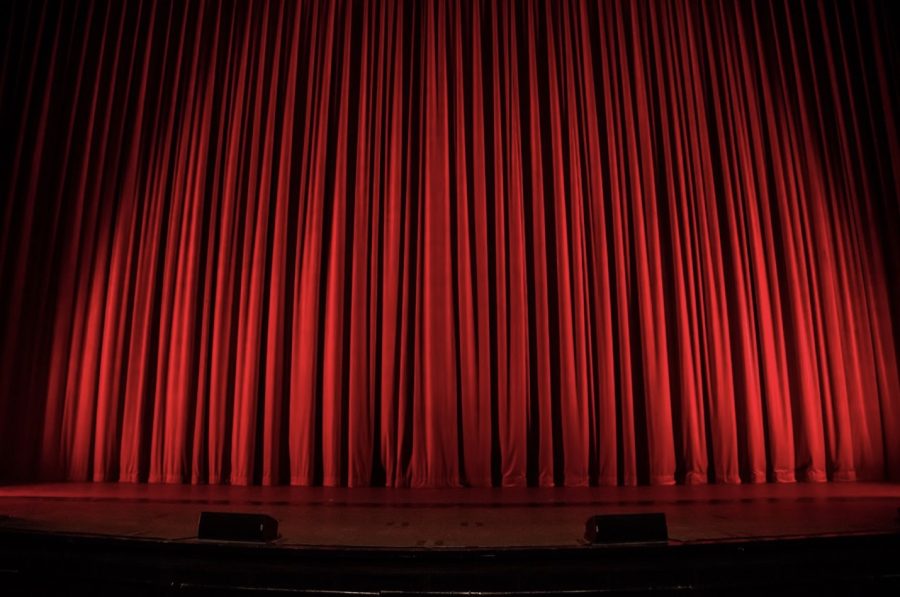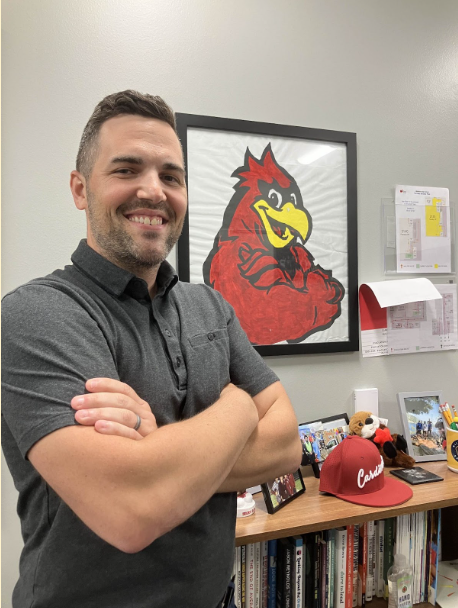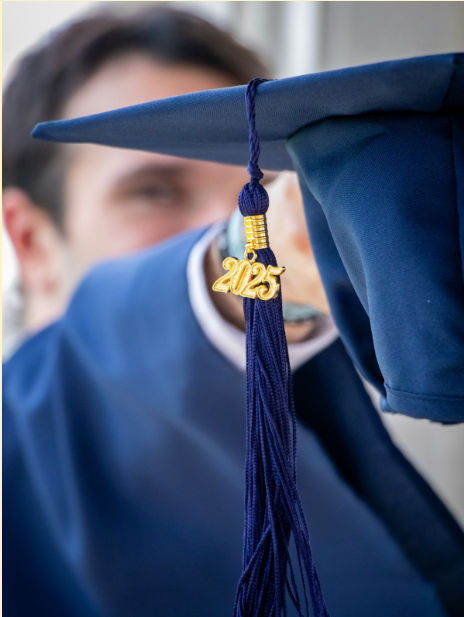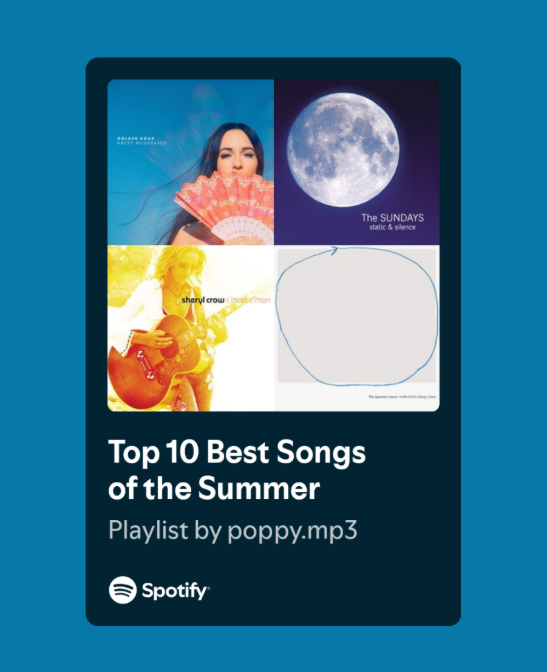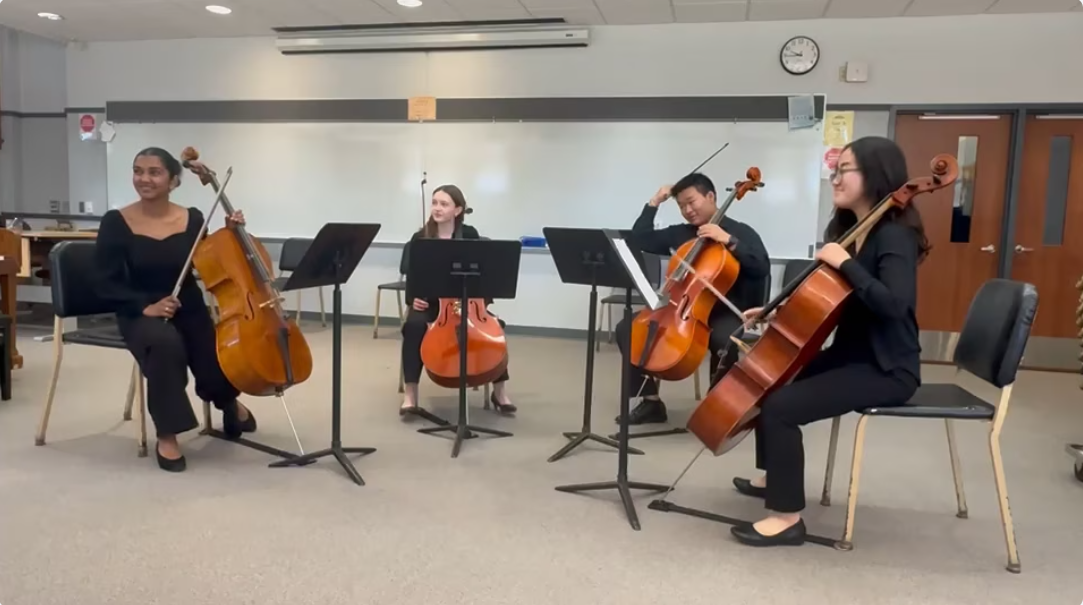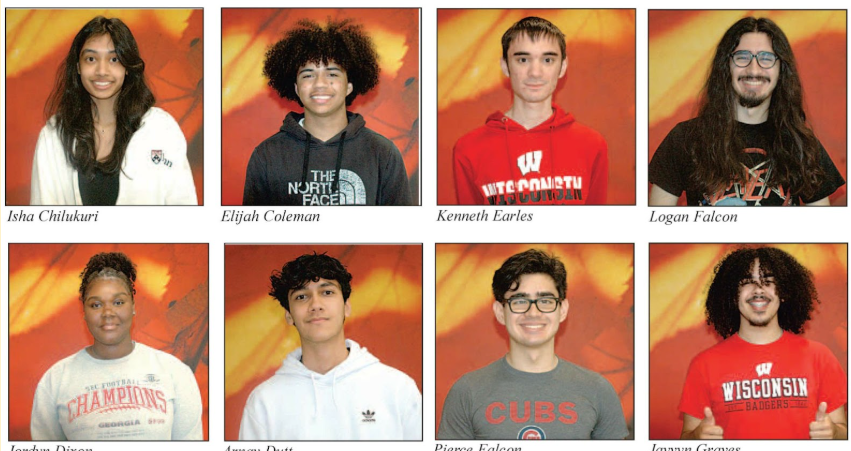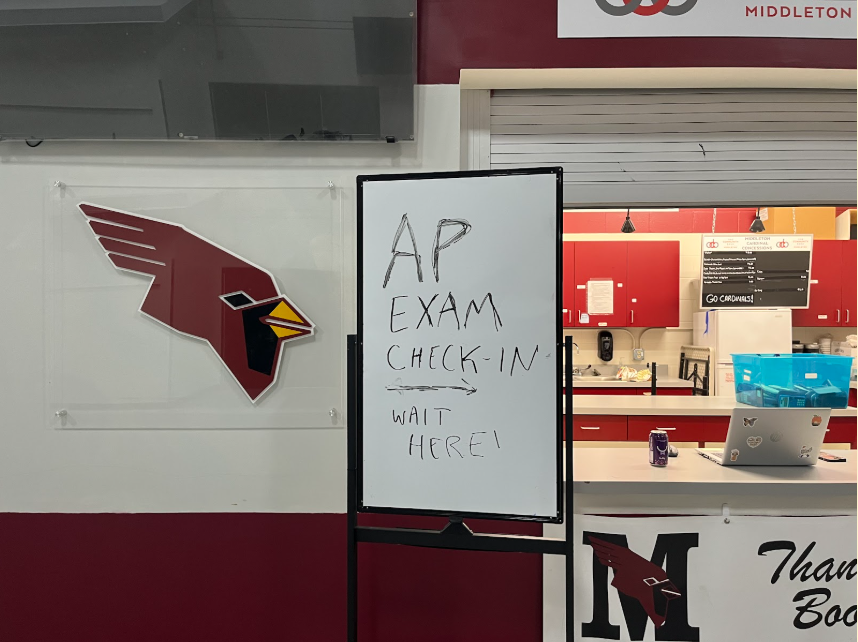Introducing the Winners of the 2023 MHS Concerto-Aria Competition!
A record 35 student musicians auditioned in the 2023 Concerto-Aria Competition. The three winners, Sarah Blust, Flynn Ewer and Janice Chung, will get to perform with the symphony orchestra in the annual Mike Dewey Concerto Showcase on March 2.
February 1, 2023
A pianist performed on the stage. Her playing was awe-inspiringly beautiful; her fingers were firm but also malleable, flying across the ivory, and the sound filled the entire auditorium, coming alive. She would soon be named one of the winners of Middleton High School’s 2023 Concerto-Aria Competition.
On Tuesday, Jan. 10, 2023, from 5:30 to 10:30 p.m, a record number of talented Middleton High School (MHS) student musicians readied to perform at the 2023 Concerto-Aria Competition. The winners would get to perform at Fine Arts Week as well as have the opportunity to play with the full symphony orchestra at their winter concert on March 2. Honorable mentions would also get to perform in front of their peers during Fine Arts Week.
On the stage of the MHS Performing Arts Center sat this year’s three judges: Joe Greer, Operations Assistant for the Wisconsin Youth Symphony Orchestras (WYSO); Rachael Billman, choir teacher at Glacier Creek Middle School; and Carl Davick, orchestra teacher at Monona Grove High School.
There were a total of 35 performances this year, all worthy of praise. The competition was soaring, and the 2023 winners and honorable mentions were exceptional.
For the participants of the competition, music is a form of expression. Music is a language that everyone can learn; where you live, what familial background you come from and how much money you earn is negligible because music is universal. The following individuals and their fellow competitors brought a life and intensity to music that is unseen at any other time of the year at MHS. I sat down with each winner a few days after their audition to talk about their experience.
Without further ado, here are the 2023 Middleton High School Concerto-Aria Winners!
The following interviews have been edited and condensed.
Winners
Sarah Blust
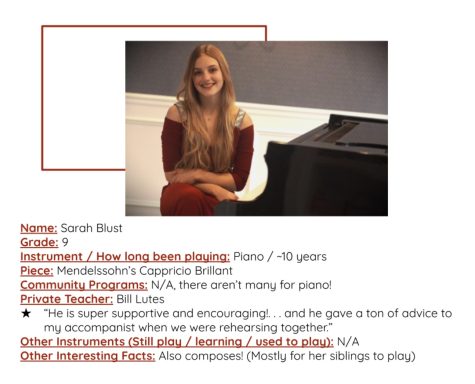
Q&A:
Eunice: How were you feeling before the concerto competition?
Sarah: I was terrified! I get pretty bad performance anxiety, so I went to the bathroom to wash my hands because my hands were sweaty, and I was practicing what I was going to say to the judges and how I would walk up because I could barely function. I was so nervous.
E: How were you feeling during the performance?
S: It’s kind of all a blur now because I was [filled with] adrenaline there, but I was definitely able to have more fun with it than I expected because I really enjoy working with my accompanist and it’s just a really fun piece. It was terrifying but also really exciting.
E: How were you feeling after the performance?
S: Well, I was really glad to be done with it. I was glad that I had survived, but I was also not expecting to win because I did not think that I did it super well.
E: How did you react when you heard you won?
S: Okay, so this is actually a funny story because I was in math class we were doing retakes — well, I hadn’t started doing retakes yet, but so I got a text from my sister and she sent me a screenshot of a conversation with her friend. Her friend said, “Huge congrats to your sister for winning the competition!” And she was like “Wait, did you win?!” And I was like, “I WON?!” And then she sent me a picture her friend had taken of the poster in the band room of the winners, and I was freaking out and super happy.
E: How do you feel about winning as a freshman among seniors?
S: Well, it’s super exciting, and I’m super glad to be able to play with the orchestra because that’s going to be so much fun.
E: How are you feeling about playing with the orchestra?
S: Well, I’ve never played with any string instruments except for my sister and my dad, so that’s going to be a totally new experience, but it’s going to be so much fun, especially rehearsing when there’s not the pressure of the stage!
E: Any shoutouts to specific people you want to thank for your accomplishment?
S: My dad for being super supportive. And kind of giving me a lot of advice and encouragement. And having faith in me! Actually my sister for having faith in me because she was completely confident that I would win it. I could shout-out every single person, but I don’t know every single person that’s ever impacted my musical career. I guess, my piano teacher for being amazing.
E: What piece of advice would you give to future competitors?
S: Don’t take it too seriously. Just really enjoy the performance and the time, because that makes such an impact on your performance if you’re having fun with it.
E: What piece of advice would you give to everyone, including non-musicians?
S: Maybe, listen to classical music because it’s really underappreciated.
E: Do you think everyone should take part in a music program?
S: It’s not good to force it. But it also adds so much meaning to your life if you have something like music that’s creative and kind of emotional.
E: How do you feel when you play music? And are there more reasons why music is important to you?
S: As I’ve grown up, it’s become more a part of who I am, and it’s kind of how I express myself. Especially composing, because you can put so much of your emotions and experiences into music. It’s also really fun to see yourself progress, and it’s really satisfying to [perfect] technical stuff.
E: Do you think musicians are respected enough in our school community? If yes, why? If no, why not?
S: Well, the shorter answer is no because they didn’t even put the winners on the announcements. They literally put everything on the announcements.
I feel like music, especially classical music, is not appreciated enough, and that kind of translates to musicians because you can’t understand how great it is unless you have devoted your life to it.
Flynn Ewer
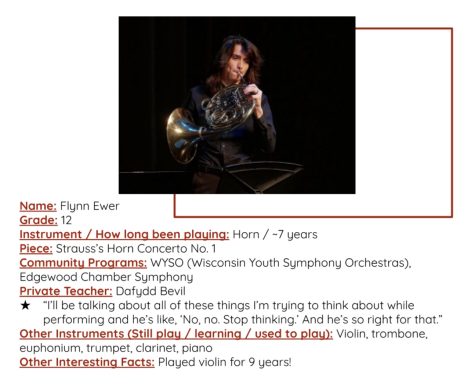
Q&A:
Eunice: How were you feeling before the concerto competition?
Flynn: I was feeling a little anxious before the performance because I did some other competitions and they didn’t go very well for me. I just didn’t perform at my best at them because of random circumstances, like them holding me for 15 minutes after my warm-up to just sit. I was just worried that that was going to happen. But it didn’t, so those worries were unfounded.
E: How were you feeling during the performance?
F: It was kind of weird because I was making some eye contact with the judges. I wasn’t sure if that was what I was supposed to do or not, so I was a little awkward about that. But besides that, because of what my teacher said, I was trying to think as few thoughts as possible. I was just trying to not feel.
E: How were you feeling after the performance?
F: I felt like I didn’t play perfectly. The parts that I did wrong, I messed up a decent amount. Right at the beginning, I missed three notes in the first measure. So my inaccurate parts weren’t very accurate, but I felt like the parts that I did play well, I played pretty well. And I was proud of the parts I didn’t mess up.
E: How confident were you about winning?
F: I was not very confident because I had heard a couple of the other performances.
E: How were you feeling when you heard you won?
F: I was in the middle of shop (woodworking and metals class), welding a shield. And your sister texted me saying, “Congrats! We won!” And I was like, “Ay, yo! What?!” And I just didn’t really process the information until 30 minutes later when I actually went up to see the results on the orchestra wall.
E: How do you feel about winning as a brass player? It’s not common!
F: I think it’s an accomplishment winning as a brass player for sure. Someone told me that it’s been over a decade since a brass player has won; the judges are rather biased against us because we have to empty our spit. In previous competitions that I was doing, they were like, “Maybe you can go clean your instrument a little more discreetly”. . . But this time we have some brass representation in the judges panel. They gave us a fair chance, they didn’t give us a disadvantage.
E: How do you feel about playing with the orchestra?
F: I’m kind of scared. I don’t always play at my best because 10 percent of the time when I’m performing, it’s a good day and I’ll sound good. But I’m not always at that place. So hopefully Mr. Kurr doesn’t obliterate me.
E: Do you have any shout-outs to specific people you want to thank for this accomplishment?
F: I mean my accompanist, shout-out to Sean, he took the dynamics and he made them, he validated them and made them stick and [made them] meaningful. Shout-out to Joe Greer. Shout-out to Janice for also winning as a fellow wind player. We need to represent band!
E: Any advice you want to give to future competitors?
F: I would say, try and tell a story with the music that you’re playing. Don’t just have the goal of only playing the song with all of the notes there. To win a concerto competition, you have to envision a story that goes with [the music] or some sort of thing that the music is trying to say —it doesn’t have to be a story. And portray that. That puts some musical substance behind what you’re playing and it actually feels meaningful.
E: What do you want non-musicians to know about the music community?
F: We don’t know more about these mystical sounds than you do. We’re just desperately trying to grasp at straws to figure out why the funny little sound waves sound so cool. But we don’t know what we’re doing either, despite the appearance of maybe looking like we do.
E: Do you think musicians are respected enough in our school community? If yes, why? If no, why not?
F: No, because band kids exist. I think people who try hard to be part of an orchestra dedicate a lot of work towards it. Especially as a string player. And that could deserve a little more respect, orchestra playing. A lot of bands kids and what they say, they’re not too inaccurate. I think classical music deserves more credit. Because the stuff from the romantic era slaps.
Janice Chung
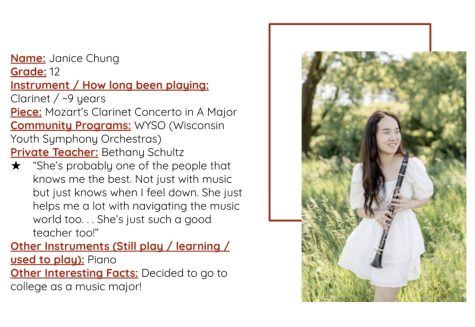
Q&A:
Eunice: How were you feeling before the concerto competition?
Janice: Because I’ve been so stressed about music auditions, my first priority definitely wasn’t competitions this year, so I wasn’t as nervous as previous years leading up to it because I just didn’t have time to worry about it. But when it came to the day of the competition, like when warming up, that was when I started really feeling the nerves again.
E: How were you feeling during the performance?
J: I’ve been feeling more comfortable with the piece because I’ve been practicing it for a while. I wasn’t nitpicking myself this time around, which I think might’ve also helped me because usually I’m very nitpicky, even throughout the performance.
There’s this one section in the concerto that’s around nine, ten lines where it’s just straight runs the whole time, and that part’s definitely one of the hardest parts. I remember in the middle of the fifth or sixth line, I was starting to be like, “Oh, no. Am I rushing or am I going to miss this note?” I actually felt myself think that, but as soon as that happened, I remember myself being like, “No, I can do this.” So I kept repeating, “I can do this.” And I kind of got through it.
E: How were you feeling after the performance?
J: As soon as I finished, I actually felt really satisfied with my performance. I think it was one of my best runs and I remember bowing after they clapped and going off the stage, and I was really happy about it. I felt like I didn’t have to win so I kind of just played.
E: How were you feeling when you heard you won?
J: It was in the morning during first block. I was in AP Stats and I got a text from you (Eunice), sending me a picture of the results. I immediately saw 21 texts so I was already assuming that maybe me or you had either gotten honorable mention or even winner. I was not even thinking about winner though. To be honest, I was like, “Maybe honorable mention…?” As soon as I saw the picture, I was really freaking out during Stats. Everyone in my group can attest to that because I was really freaking out. I was not expecting that. At all.
E: Were you confident about winning?
J: It’s kind of natural for everyone to compare, and I think, looking at this year too, there were a lot of amazing people that were also a part of it, so I didn’t think I had a chance at winning, at all. After coming out of the performance, because of how satisfied I was, I was kind of like, “Maybe, maybe if I was really lucky, I could see honorable mention,” but I definitely did not think “winning.”
E: How do you feel about winning the competition for the second time while in high school?
J: I think it’s really cool. Not a lot of people do that, and like you said, it’s really rare to even win once, and the fact that I got chosen to win twice is really cool if I do think about it! Because of that [virtual year] I wasn’t able to actually play live with the orchestra. This time around, I have an opportunity to play with the orchestra, so that’s a big difference. And to close off senior year like that is kind of good, I guess.
E: Do you have any shout-outs that you would like to make?
J: I think it would definitely be my parents, because obviously learning an instrument and having it for a long time is really hard because there’s a lot of lessons and things like that. Taking me to lessons, paying money so I could do things — definitely family.
Definitely Bethany, my private lesson teacher, because I’ve been studying with her for so long, so she’s seen me get into things and obviously get rejected from things too. She’s kind of seen me all the way through.
I would say Mr. Brown, because I’ve been taking lessons from him. He’s the sole person that’s been helping me through music auditions and music applications. And also, he’s kind of my therapist! He’s definitely seen a lot of sides of me! It’s really nice to have someone that can help me with that.
And then performance-wise, I would also thank Ms. Stine (my accompanist) because I practiced a lot with her for pre-screenings as well, so she’s done a lot of rehearsals with me. Without her, it would’ve been hard.
E: What piece of advice do you want to give to future competitors?
J: I think the best advice is to find a piece that you’re comfortable with and you know you’ll be able to showcase the best, and then also to just do it. Because it doesn’t hurt.
E: Do you have any advice for students, including non-musicians?
J: That there’s always going to be people who are better than you and things like that, and there are always going to be people who look up to you, too. Either way, you have to have confidence in yourself. Just because someone achieves more and you get all of these rejections, it does not make you any worse. You still have your self worth. It doesn’t mean you’re a musician, person or athlete that’s less. You still have to have confidence.
E: Do you think everyone should take part in the music program?
J: I just feel like everyone should have a way of expressing emotions or have an outlet to express. Some people love music and for some people it might not be the best fit, but it could be music or art, like drawing. There are a lot of outlets, and if music is something that can be used for expression, and if you love doing it, you definitely should.
E: Why is music important to you?
J: I’ve been doing it for so long, starting from piano at 5 to going into clarinet, and at first, it was just lessons and learning a new thing. It has its downs too — to find motivation to practice and things — but there’s a lot more pros for me. At the end of the day, even though it’s hard, I’m so thankful that I started music. It’s opened a lot of community opportunities. I met so many people through it, and I attach a lot of emotion to music.
E: Do you think musicians are respected enough in our school community? If yes, why? If no, why not?
J: I think that especially at school, if you’re in the music community, [you] can feel it. They know there’s a lot of favor towards athletics, not as like a “Oh my god, this is competition. Let’s draw a line,” but genuinely, I think everyone can see that. People in the music community can respect each other and know how hard it is but also how fun it is, but there’s a stigma around people who do music in high school for some reason. I don’t really know why. Because of that, I think they are less respected. You also mentioned how seniors in athletics and all are getting recognized with their pictures hung up in the concourse and things like that, but in music, there’s not something like that. There’s also, I realized a few days ago, that they didn’t even mention about the concerto competition or anything in the announcements, and marching band was also not recognized last year until we called it out.
Honorable Mentions
Emma Song (12th grade, violin), Ethan Bo (10th grade, piano), Indre Raghavan (ninth grade, violin), Juliette Mandelbrot (11th grade, cello), Ruthie Nelson (11th grade, marimba), Anna Gruett (11th grade, violin), Eric Ma (11th grade, piano)
As the winners mentioned, people that practice music are, unfortunately, not as respected for their accomplishments as some other students. There are countless examples in the MHS school community of this disparity that not many know of.
Even just in the marching band: this year they had food thrown at them, their performance was pushed to after the homecoming football game when the bleachers were empty and they received little to no recognition for their awards. Each year there are enranging comments after Fine Arts Week performances degrading individuals for their performances. The school board even considered cutting fourth grade orchestra because of financial issues.
Dr. Chris Allen, manager of the Omaha Classical Radio and professor at the University of Nebraska, explained, “Music’s power is undeniable. It is used to evoke every emotion. It has been used to rally patriotism in times of war, as anthems of change during protests, as lullabies at bedtime, as remembrances at funerals, to calm us in turmoil, as a refuge from the chaos of the world around us.”
The ten exemplary performers introduced above, and many others, are producers of one of the most impressive modes of creativity in our world, and they should be respected for their commitment and dedication to music. These incredible people are in this school, in your classes, athletics and in the community. Musicians are more, so please, give them more.
Again, the loudest, most enthusiastic congratulations to the musicians above! The MHS community is exceptionally proud of you!



